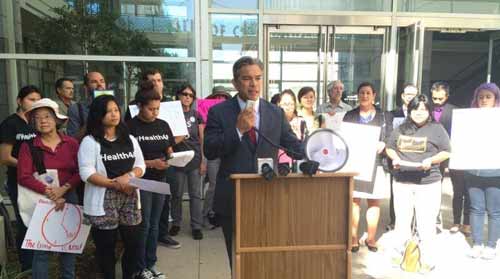NEW ORLEANS, La. — In 2014, Professor Patrick Johansson of the University of Nebraska Medical Center conducted a study of over 400 older Latinos in rural areas of his state. Among the findings were that Hispanics “experience a high degree of depression due to perceived discrimination.”
The analysis, which is currently under review for scientific publication, found that those who reported high levels of discrimination also had a 60-70 percent rate of depression, said Johansson, who spoke at the Gerontological Society of America (GSA) Conference in New Orleans last week.
That study came before Donald Trump famously launched his presidential campaign earlier this year, deriding Mexicans coming into the United States as “rapists” and “murderers.”
His words towards immigrants and Latinos did not soften during his campaign, and now that he’s won the presidency, there have been numerous reports of discriminatory acts against Hispanics, not only in rural areas, but also in large cities, such as Los Angeles and San Francisco.
‘We’re Going Backwards’
Last week, the Spanish language daily La Opinión in Los Angeles reported on the case of a teacher who, after Trump’s win, was recorded telling Latino students in a South Los Angeles middle school that their parents would be deported, leaving them to be placed in foster care. The school district fired him afterwards.
The same week in San Francisco police arrested a man accused of pulling the hair and neck of a Hispanic nanny at a park and telling her, “no Latinos here.” The woman suffered some scratches and was shaken by the episode.
Lourdes Dobraganes, a Latina childcare provider from San Francisco, and member of La Colectiva and the California Domestic Workers Coalition, said of that attack: “We’re entering a moment that makes me sad and afraid, because it feels like we are going backwards.”
Depression and anxiety
Feelings of sadness, fear and anxiety are some of the symptoms associated with depression, a debilitating and often undiagnosed mental condition that already plagues a number of Latinos.
The National Institute for Mental Health (NIMH) notes depression is characterized by changes in mood, self-attitude, cognitive functioning, sleep patterns, appetite and energy level.
Depression affects more than 15 million American adults, or about 6.7 percent of the U.S. population age 18 and older in a given year, reports the Anxiety and Depression Association of America. People ages 45-64, women, minorities, those unemployed, and people who were previously married are most likely to meet the criteria of major depression.
Iveris Martinez, an anthropologist at Florida International University in Miami, who conducted a study on the “prevalance of depression and its related social factors among Hispanic older adults” around Miami-Dade County, found that it affects around one-in-four (26.7 percent) Latinos surveyed.
But many were not diagnosed, she said, in part because of cultural and linguistic differences.
In Latino culture there’s also a “stigma of going to a psychologist” and being considered “crazy,” noted Martinez.
“Many people think it’s normal to feel sad as you get older,” explained Martinez, who also presented her findings at the GSA convention.
Both Johansson and Martinez said it’s plausible that the uncertainty Latinos – and particularly undocumented immigrants – are feeling with Trump’s win may lead to added depression rates among Hispanics.
“If you feel insulted and vulnerable, that affects stress and stress is not good for your health,” Martinez said.
This article was written with support from the Journalists in Aging Fellowships, a program of New America Media and the Gerontological Society of America, sponsored by the Silver Century Foundation.









